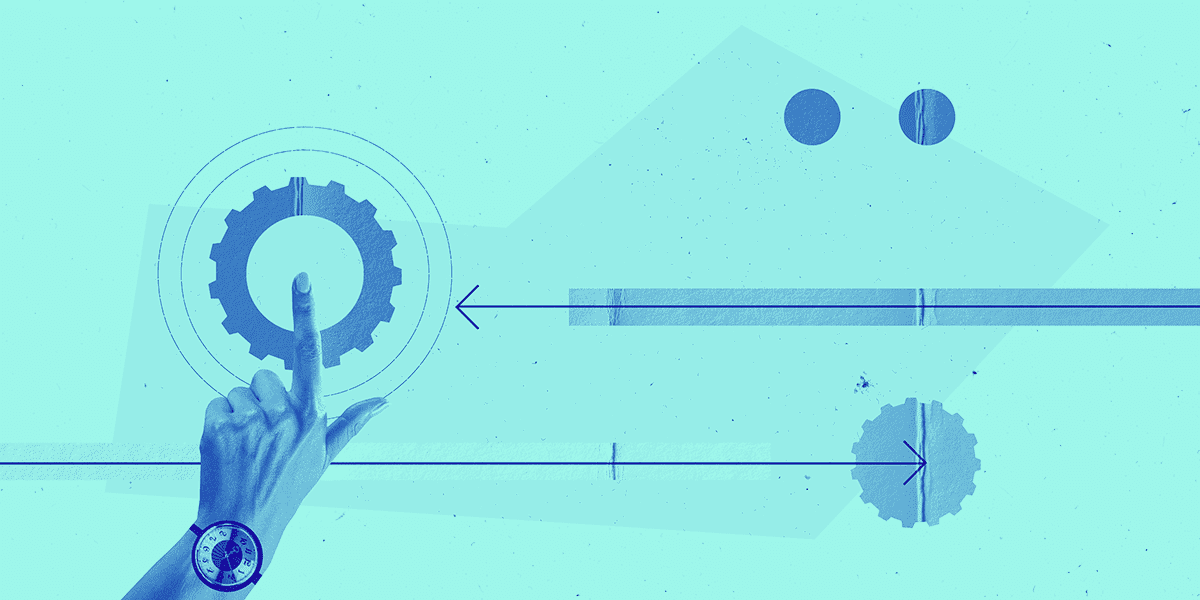Table of Contents
What goals do you have right now?
To make a career change? Learn a new skill? Take up a new hobby? Be more productive?
Whatever it is, I bet you have an image of how you’ll reach it, which probably goes a little something like this.
It may be tough at first, but you’ll slowly pick up the pace.
You’ll always feel motivated because you want it—and even when you’re not feeling motivated, you’ll manage to pull yourself out of the slump and get back on track.
Making progress on a regular basis will be easy because you’ll hit your milestones, reach your goals, and move on to the next.
If only this was how the story goes.
The real truth is that the path to reach your goals never goes according to plan
Whether it’s a New Year’s resolution or a goal that you’ve set for yourself throughout the year, the road to success is actually a wandering, garbled mess:

You may have a plan to achieve your goals, along with set milestones and checkpoints. Don’t get me wrong, that’s a fantastic start. However, this plan isn’t going to be there for those times when you veer off course, or you’re in the middle of the scribble and unable to see through to the other side.
Those are the moments when you need to trust the process—but if you don’t have solid processes in place, this is where it becomes easy to veer off course or fall off the bandwagon.
A true story about goal setting and the power of process

I had been in my new job for about six months. Everything was going well, but I was struggling to manage my time. I felt like I was scattered every single day, and it was difficult to stay on one task without getting distracted by an email or a colleague desk-bombing me.
I wanted a promotion and had to step up my game, so I set myself a goal to be more productive.
I knew the end state that I wanted to achieve—a state of focus where I could smash out what I wanted to do—and even set my goal to be measurable and time-focused. The deadline I gave myself was one year. My productivity would be measured based on my daily productivity ratio and how many days I had achieved the tasks I wanted to achieve.
For a few months, I tried to wear headphones at work to block out the noise. I put times in my calendar for work so that other people wouldn’t set meetings for that time. I sat in a quiet corner of the office to be less disturbed by the noise around me. Sometimes, I would even tell people not to speak to me so I could get work done.
After a while, I felt like I had tried a lot of actions…but nothing was really working.
It wasn’t until I heard about process-oriented goals that I realized what I was missing.
I knew what I wanted to do. But I was missing the map and the method to get there.
I threw out everything I did, went back to the drawing board, and figured out a new plan of attack. Instead of focusing on outcomes, I focused entirely on processes that I knew would help me become more productive:
- I wanted more time to focus on my to-do lists and less time catering to others. So I decided to set three “email checking” times throughout the day to give myself a little bit more structure. If someone needed me urgently, they could call or message me—otherwise, I’d get to their email when I got to it.
- I wanted to smash through my tasks, but not all of them were equal. I have more energy in the morning, so I would always write my to-do lists in order of most difficult to least difficult tasks. The hardest ones I would do when I had more energy; the easier ones when I had less.
- I knew I needed some zones of “deep work,” where I got stuck into a big project or a task that required maximum focus. I would plan those around the middle of the week and choose to do them from home rather than the office, so I wouldn’t have as many distractions.
These three simple processes allowed me to maximize my time each day and get more out of my work hours without killing myself working overtime. The one-year mark at work came, and I had achieved everything I wanted and then some—and along the way, I became a huge convert of process-oriented goals.
Why process-oriented goals hit different
There are three types of goal-setting:
- Performance-based goals, which are based on your own standards of what you view as “good performance.”
- Outcome-based goals, where the end goal is to achieve something specific, such as getting your dream job or receiving an offer from your dream college.
- Process-oriented goals, which are centered around the processes and actions you need to take to achieve your desired outcome.
Notice anything in particular about these three types of goals?
Two are based on factors you can control. One isn’t (I’ll let you guess which).
Here’s the thing.
Most of us set outcome-based goals—for example, to become CEO at your dream company, start your own business, lose 10 pounds, or find a partner. However, some factors completely out of your control will influence each of these outcomes, like whether you’ll meet the right person or your dream company will even give you an interview.
Rather than starting with the end goal, process-oriented goals emphasize the road to reaching the desired outcome. By following the process, you naturally achieve performance—and the outcome is a byproduct of the process, not the end game.

So why do process-oriented goals work so well?
1. They give you a clear direction
With an outcome-oriented goal, you put all of your eggs in the final basket: the outcome. If you don’t reach it, you feel like a failure.
With process-oriented goals, it’s the opposite. You focus on having a path and following it to your final destination, but you’re free to enjoy each step you take as you progress toward the end result. You can veer off course, slow down, or speed up, but you have the comfort and knowledge that you’re on your way somewhere.
2. They’re focused on progress, not perfection
I’m a natural overachiever and a recovering perfectionist. For me and many others who share similar traits, outcome goals can almost be detrimental.
Yep, you read that right: goal setting can have the opposite effect of making us worse, not better.
This is because we often have an obsession with reaching the outcome and reaching it with a clean path. When we miss the mark, we beat ourselves up, which can have a negative impact on our mental health.
Process-oriented goals are more suitable because they focus entirely on the journey. They help you place (and derive) value from actions rather than relying on milestones alone to validate your efforts.
3. You get a better understanding of what it takes to reach your goal
I used to think that I wanted a low body fat percentage.
When I actually broke down the process to reach that goal, I realized pretty quickly that what I really wanted was to spend time with my friends and eat good food when I wanted, not meal prep and bring my own Tupperware to dinner.
Focusing on processes will force you to get crystal clear on what it takes to reach your goal. It gives you a clear pathway to a bigger goal and confidence that you’re on the right track, even if you’re knee-deep in the middle of the squiggly road to success.
4. They’re more motivating
Imagine yourself setting a goal to run 5 miles. You might steadily work toward it by going on regular runs but get frustrated that you’re not progressing as quickly as you imagined.
Now imagine you’ve set yourself a process to improve your running.
On week one, you run 20 minutes; week two, 25 minutes; week three, 30 minutes; and so on. Every time you run, you get a sense of accomplishment. Every week you up your time, you also get a sense of accomplishment. And before you know it, you’re running 5 miles easily—because you were focused on following the process and didn’t get discouraged when you didn’t reach 5 miles by X date.
Examples of process-oriented goals
If it’s your first encounter with process-oriented goals, it can be tricky to identify the difference. Here are three examples that show what focusing on the process looks like, as opposed to focusing on the outcome.
Instead of “I want to lose weight”…
- Set a goal to walk for 25 minutes every day.
- Only drink alcohol on the weekends.
- Try to hit your daily servings of fruit and veggies.
- Drink at least eight glasses of water a day.
Instead of “I want to switch jobs”…
- Update your resume and LinkedIn.
- Send out a resume a day.
- Try to attend one professional networking event every week.
- Do a mock interview every week.
Instead of “I want to work for myself”…
- Build your own website.
- Reach out to at least 3-5 companies offering your services every week.
- Take on at least three relevant projects to beef up your portfolio.
- Connect with 2 people who have done similar jobs and ask for their insights.
Setting process-oriented goals: your quickstart guide

Hopefully by now, I’ve sold you on the benefits of setting process-oriented goals. Now, here’s how to put this into action in your daily life:
- Start with the big picture. Process-oriented goals aren’t about the outcome. To start, you need to look at the desired outcome you want to achieve. Write down your big goal in a journal, then try to define that as much as possible in tangible terms. For example, if you say you want to be healthy, what does that look like for you? This helps you get clear on the processes that will help get you to your path.
- Make it smaller. Those definitions? Take those, break them down into their basic parts, and turn those into your goals. Going back to the “be healthy” example: if you mean that you want to eat all of your vegetables, think about how you can fit those into your daily routine—then turn that process into your goal.
- Don’t be afraid to wander. Not all who wander are lost, particularly when it comes to setting process-oriented goals. Along the way, you might find that you meet new people that lead you on a career path you never dreamed of, or you might discover a new hobby. Let yourself go along with it—you never know where you might end up.
Focus on the process and enjoy the journey
When you set process-oriented goals, it becomes less about the destination and more about the road to get there. Rather than fixating on a future state of success, you’re creating a lifestyle and building habits that will hopefully stay with you for the rest of your life.
And hitting your goals? It’s just a (very sweet) byproduct of that journey.


